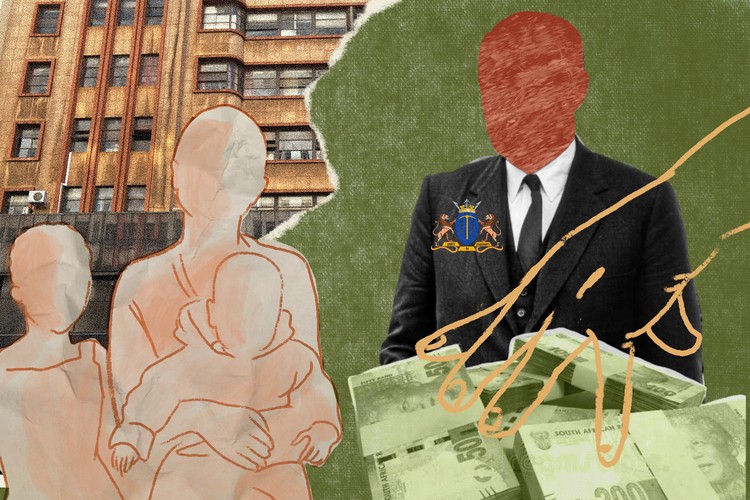Gauteng Department of Social Development ordered to explain its funding decisions
Unfunded non-profit organisations to file a combined summons
The Gauteng Department of Social Development will have to explain in court why it did not fund hundreds of non-profit organisations for the 2024/25. Illustration: Lisa Nelson
- Hundreds of organisations could have their funding rejections from the Gauteng Department of Social Development reviewed by the High Court.
- This comes almost a year after the department’s funding process for non-profit organisations collapsed, causing delays in payments and some organisations to close.
- Dozens of organisations have still not been paid in full for services rendered for the department.
The Gauteng Department of Social Development will have to explain in court why it did not fund hundreds of non-profit organisations for the 2024/25 financial year (1 April 2024 to 31 March 2025).
On 31 January, the High Court in Johannesburg ordered unfunded organisations to file a combined summons by 17 February and for all parties to appear in court on 7 March.
This forms part of ongoing legal action brought by the Gauteng Care Crisis Committee, a voluntary association of non-profit organisations.
Any organisation that meets these criteria can join the court action
- organisations whose applications for funding in 2024/25 were rejected;
- organisations that signed a year-long contract/service level agreement with the department for 2024/25 but have since received rejection letters; and
- organisations that signed a year-long contract/service level agreement with the department but later received a second contract for less than 12 months of funding.
Affected organisations have been requested by the crisis committee to make contact by Tuesday (11 February) should they wish to join the combined summons.
The department has previously stated that of the 1,723 funding applications it received, it could only approve 1,329 of them, leaving 394 unsuccessful.
The department has not yet been able to provide a comprehensive list of all funded and non-funded organisations. A report filed to the court by the department last week, in compliance with the court order obtained by the Gauteng Care Crisis Committee, contains a list of 255 organisations that had their funding applications rejected for 2024/25.
Letters of rejection were sent to 140 organisations on the list after 29 January; 44 have not yet been sent rejection letters.
Comparing this list to GroundUp’s records, it does not appear to be a complete list of organisations that had their funding applications rejected.
The report also contains a list of 111 organisations that have been successful in their applications: ten of these have not concluded service-level agreements and therefore have not been paid. Of the 101 organisations that have signed service-level agreements, 40 have not been paid at all, and 21 have only been paid for the fourth quarter due to insufficient funds.
The department filed a supplementary report showing another 111 organisations were not paid due to closure, non-compliance or ongoing investigations. GroundUp has ascertained that this list is outdated and not entirely accurate.
The cause of the funding delays
The administrative mess comes almost a year after the department’s funding process for non-profit organisations in the 2024/25 financial year completely collapsed. The process was supposed to be completed before April 2024, but dozens of organisations are still unpaid.
The chaos stems from the department overhauling its funding adjudication process and appointing independent panels to allocate funding. This was apparently in response to corruption findings dating back to 2016-2018. But delays and dysfunction in the new process caused hundreds of organisations caring for vulnerable citizens to go more than two months without funding.
Most of the officials implicated in the corruption findings still work at the department and disciplinary processes have failed.
After a May 2024 court ruling, the department reverted to its previous adjudication process, extending the contracts of organisations that were funded in 2023/24. The department over-extended its budget by signing contracts both with new and previously funded organisations. Some organisations were paid even though they had not applied for funding for 2024/25. Now there are dozens of organisations that have not been paid in full, because the department has run out of money.
The department has tried backtracking on some of its service-level agreements and said it could only pay some organisations for the fourth quarter of the year. It sent rejection letters to several organisations that had already signed service-level agreements for 2024/25.
But after the Gauteng Care Crisis Committee took the department to court again in January, acting department head Bongani Ngomane admitted that legally the department has to pay the organisations for the full year.
Ngomane said all organisations that can prove they have been providing services on behalf of the department since the start of the financial year are entitled to full payment. But the department will need to apply for additional funds from Treasury to do so.
Support independent journalism
Donate using Payfast

Don't miss out on the latest news
We respect your privacy, and promise we won't spam you.
Next: 1,500 Lesotho health workers sent home after US aid suspended
Previous: 18 vehicles burnt in Nyanga
© 2025 GroundUp. This article is licensed under a Creative Commons Attribution-NoDerivatives 4.0 International License.
You may republish this article, so long as you credit the authors and GroundUp, and do not change the text. Please include a link back to the original article.
We put an invisible pixel in the article so that we can count traffic to republishers. All analytics tools are solely on our servers. We do not give our logs to any third party. Logs are deleted after two weeks. We do not use any IP address identifying information except to count regional traffic. We are solely interested in counting hits, not tracking users. If you republish, please do not delete the invisible pixel.

